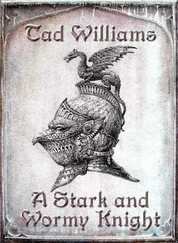Vansen sometimes wondered if this hunger for height and solitude the gods had put in him might not be stronger now than ever, especially with the much greater number of people around him in Southmarch, swarms of them filling the castle and town like bees in a hive. Did any of them, noble or peddler, soldier or serf, ever look up as he did and wonder at the loftiness of Wblfstooth Spire, a black scepter-shape that loomed over even the castle’s other towers as the distant snowcapped mountains had dominated the hills of his boyhood country? Did any of the other guardsmen marvel at the sheer size of the place as they walked the walls, these two great uneven rings of stone that crowned Midlan’s Mount? Was he the only one secretly thrilled by the liveliness of the place, the people and animals streaming in and out through the gates from sunup until sundown, and by its grandeur, the antique splendor of the king’s hall and the massive residence whose roofs seemed to have as many chimneys as a forest had trees? If not, Ferras Vansen couldn’t understand it: how could you spend every day beneath the splendid season-towers, each of the four a different shape and color, and not stop to stare at them?
Perhaps,Vansen considered, it was different if you were born in the midst of such things. Perhaps. He had come here half a dozen years ago and still could not begin to grow used to the size and liveliness of the place. People had told him that Southmarch was as nothing compared to Tessis in Syan or the sprawling, ancient city-state of Hierosol with its two-score gates, but here were riches to spare for a young man from dark, lonely Daler’s Troth, where earth and sky were both oppressively wet most of the time and in winter the sun seemed scarcely to top the hills.
As if summoned by chill memory, the wind changed, bringing needles of cold air from the ocean that pierced even Vansen s mail shirt and surcoat. He pulled his heavy watch-cloak more tightly around him, forced himself to move. He had work to do. Just because the royal family and, it seemed, half the nobles in the March Kingdoms were across the water hunting in the northern hills did not mean he could afford to spend the afternoon lost in useless thought.
That was his curse, after all, or at least so his mother had once told him: “You dream too much, child Our kind, we make our way with strong backs and dosed mouths “ Strange, because the tales she had told to him and his sisters in the long evenings, as the single small fire burned down, had always been about clever young men defeating cruel giants or witches and winning the king’s daughter. But in the light of day she had instructed her children, “You will make the gods angry if you ask for too much.”
His Vuttish father had been more understanding, at least sometimes. “Remember, I had to come far to find you,” he liked to tell Vansen’s mother. “Far from those cold, windy rocks in the middle of the sea to this fine place. Sometimes a man must reach out for more.”
The younger Ferras hadn’t completely agreed with the old man, certainly not about the place itself—their croft in the hills’ dank green shadows, where water seemed to drip from the trees more than half the year, was to him a place to be escaped instead of a destination—but it was nice to hear his father, a onetime sailor who by habit or blood was a man of very few words, talk of something other than a chore young Ferras had forgotten to do.
And now it seemed Vansen had at last proved his mother wrong, for he had come to the city with nothing, and yet here he was, captain of the Southmarch royal guard, with the north’s greatest stronghold spread before him and the safety of its ruling family his responsibility. Anyone would be proud of such an achievement, even men born to a much higher station.
But in his heart Ferras Vansen knew his mother had been right. He still dreamed too much, and—what was worse and far more shameful—he dreamed of the wrong things.
“He’s like a hawk, that one,” a soldier at the residence guardhouse said quietly to his companion as Vansen walked away, but not so quietly that Vansen didn’t hear. “You don’t ever want to rest for a moment because he’ll just drop down on you, sudden-like.” Vansen hadn’t even punished them when he found them with their armor off, playing dice, but he had made his anger bitingly clear.
Vansen turned back. The two guardsmen looked up, guilty and resentful. “Next time it might be Lord Brone instead of me, and you might be on your way to the stronghold in chains. Think about that, my lads.” There was no whispering this time when he went out.
“They can like you or they can fear you,” his old captain Donal Murray had always said, and even in his last years Murroy had not hesitated to use his knobby knuckles or the flat of his hand to reinforce that fear in a soldier who was insolent or just too slow in his obedience Vansen had hoped when he was promoted to Murray’s place that he could substitute respect for fear, but after nearly a year he was beginning to think the old Connordman had been right. Most of the guards were too young to have known anything except peace. They found it hard to believe that a day might come when stealing a nap on duty or wandering away from their posts might have fatal consequences for themselves or the people they protected.
Sometimes it was hard for Vansen himself to believe it. There were days here on the edge of the world, in a little kingdom bounded by misty, ill-omened mountains in the north and the ocean almost everywhere else, where it seemed like nothing would ever change but the wind and weather, and those would only be the familiar small changes—from wet to slightly less wet and then back to wet again, from swirling breeze to stiff gale—that so wearied the inhabitants of this small stone in the shallows of the sea.
Southmarch Castle was ringed by three walls the huge, smooth outwall of gray-white southern granite that circled the mount and whose foundations in many places were actually beneath the waters of Brenn’s Bay, a skirt of fitted stone which, along with the bay itself, made the little sometimes-lsland into what had been for centuries a fortress that could resist any siege, the New Wall, as it was called (though no one could remember a time before it had existed), that surrounded the royal keep and touched all the cardinal towers except the one named for summer, and the Old Wall that bounded the inmost heart of the keep, and within whose protective shadow lay the throne hall and the royal residence These two edifices were as riddled with hallways and chambers as anthills, so old and vast and beset by centuries of intermittent neglect that they both contained rooms and passages that had not been entered or even remembered for years.
The smaller buildings that surrounded them made the lower castle just as intricate a maze as the residence and throne hall, jumble of temples and shops, stables and houses, from the high-timbered mansions of the nobility nestled inside the Old Wall to the stacked hovels of those of less lofty station, piled so leaningly high that they turned the narrow streets between them into shadowy arbors of dark wood and plaster Most of the buildings of Southmarch had been connected over the years by a ramshackle aggregation of covered walkways and tunnels to protect the denizens from the wet northern weather and the often ruthless winds, so that sometimes all the castle’s disparate structures, built over generations, seemed to have fused together like the contents of one of the tide pools in the rocks at the ocean edge of Brenn’s Bay, where stone and plants and shells grew together into one semiliving—and no longer separable—mass.
Still, there was sun here, Ferras Vansen told himself, far more of it in a year than he had seen in his entire youth in the Dales, not to mention fresh winds off the sea. That made it all bearable, and more than bearable: there were times when just being in the place filled him with joy.
Читать дальше











